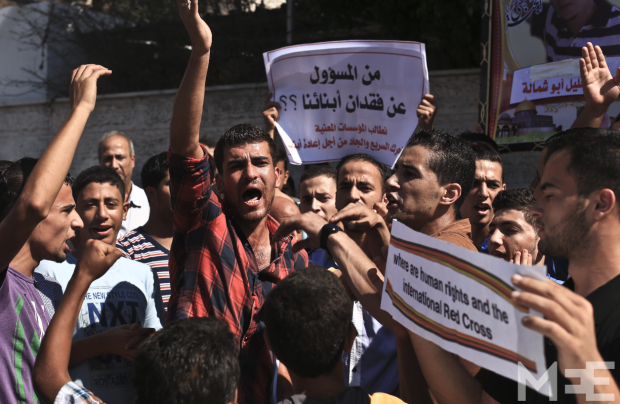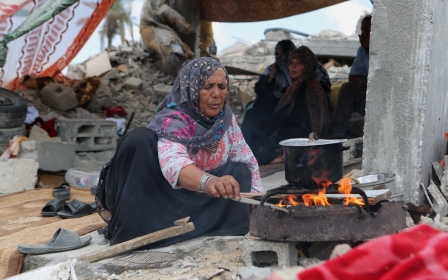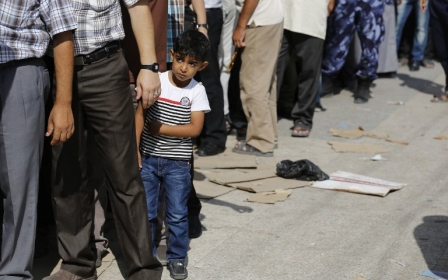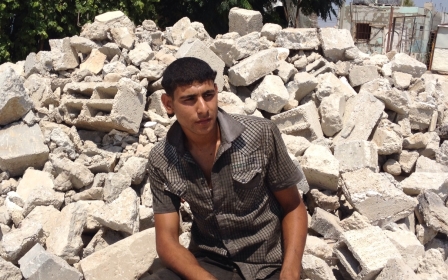Desperate Gazans lost at sea leave families searching
For many in Gaza the perilous journey by sea to Europe is a desperate attempt to reclaim normalcy in their lives, but it often ends in tragedy

Protests break out in Gaza as families demand justice (MEE / Mohammed Asad)
Published date: Vendredi 13 février 2015 - 11:45
|
Last update: 9 années 9 mois ago
Zuhair Marouf, 51, is at a loss for words. He has done everything in his power to raise questions about the disappearance of his son and granddaughter, but it is too late it seems, and it is impossible for him to find their whereabouts.
His 29-year old son Mohammed Marouf, who survived one of the deadliest Israeli attacks on Gaza in a long time, took his 3 year old daughter Lana and ran through the tunnels to escape the devastation of Israel's bombardment on the open-prison of the blockaded and besieged Gaza strip.
“There is nothing left for me in this place. I am broken and it's time to help my daughter to live”, he told MEE before he disappeared with Lana.
On 6 September, Mohammed called his father to say, “dad don’t worry about us, we are on our way to Sweden”.
But, on 10 September, the Marouf family received the tragic news that Palestinian migrants had been killed off the coast of Malta, after being smuggled onto a boat to seek freedom. The boat sank and the migrants drowned.
Zuhair is now waiting in limbo to hear if his son and granddaughter were among the victims.
With Gaza under Israeli blockade, supported by Egypt's new government at the Rafah crossing, hundreds of Gazans are forced to find alternative ways to flee the Palestinian coastal enclave, often via tunnels to Egypt or boats to Europe.
This desperate practice has been common over the past decade with Belgium and Sweden seemingly the preferred destinations for Palestinians fleeing Israeli oppression and collective punishment.
Some news did get through to the Marouf family, supposedly from one of the survivors, that the 3-year-old girl died when the boat sank, and that her father Mohammed swam for a long time before also drowning. But this news has not yet been confirmed officially or otherwise.
The Guardian explained that the smuggling boat carrying the migrants was reportedly rammed by another vessel carrying traffickers.
Mohammed Marouf ran out of all options in his life prior to this. As a car technician he mastered Volvo automobile technology, but was forced to abandon that trade when all access to spare engineering parts was blocked by the Israeli siege, causing him to lose his family income.
Some years later, he moved, to be in charge of the KIA motor maintenance department in Gaza, a job which earned him very little money, particularly given the extreme shortage of spare parts.
“Get me out of here, I want peace, to work and raise my family” he told MEE previously, while working inside a mechanics pit under a Kia Sol car.
“There is no life left here, I can't do anything without spare parts” he said as he screwed the oil container into the bottom of the car.
His brother Ahmed managed to reach Sweden after Israel’s war in 2008-2009 and has been living there ever since. He had encouraged his brother to leave and to try to achieve a better life and a better income working as a mechanic in Sweden raising his children in a violence-free environment.
Security forces in Rafah estimate that several thousand Palestinians fled Gaza through the tunnels during Israel's most recent war on the strip. Hopeful but desperate people pay a hefty fee to be transported via the Rafah tunnels to Alexandria and then on to Libya and Italy.
The whole process is one of danger and luck. The road to freedom is full of many risks. Tunnels have collapsed on fleeing refugees. Others who manage to get through are often apprehended or arrested by the Egyptian military in Sinai. Egyptian Coast Guards board some boats, while other boats sink out at sea, filled with refugees.
But all that risk seemed worthwhile to Mohammed Marouf and seemed to him to be a better option than watching his daughter grow up under oppression, in pain, and witnessing the deaths of her family in a homeland blockaded on all sides by the Israeli military. Many of his friends disagree with him and refuse to leave their home of Gaza, stating that it is Israel's plan to make the Palestinian people leave their ancestral home, to empty the land, and to colonise it.
His father Zuhair Marouf says that Mohammed's decision was only ever intended to be temporary, just until the situation improved and he was able to return, but now that return seems unlikely.
Sources in Italy and Malta suggest that a few hundred Palestinians drowned seeking asylum. Migrant groups estimate that approximately 2,900 people died this year in the Mediterranean compared to 700 who died in all of 2013.
The Geneva-based International Organisation for Migration spokeswoman Christiane Berthiaume said regarding the boat sinking near Malta, “Some 500 people were on board – Syrians, Palestinians, Egyptians and Sudanese. They were trying to reach Europe.”
But the information Berthiaume provides does not solve the dilemma of Zuhair Marouf and he is still unable to get definitive news.
One of the families in Deir el-Balah had been waiting for news about their son, but as none was reaching them, they opened up a tent of mourning and started receiving condolences. A phone call from someone in Italy then informed them that their son maybe alive after all. They had to shut down the mourning tent. But two days later, news came in again. It was not his body, but someone else who may have survived and was receiving health care in a Malta hospital. The father says his son had to leave to work and earn money to pay for surgical intervention for his mother.
His wife is unable to sleep, and the wife of Mohammed Marouf has declared the name of her husband to be among the missing on Palestinian websites. Now she is monitoring the news sites all day and night waiting for some news of hope.
Tens of families are missing. Some are complete families with no one left behind for them in Gaza except extended family members. It was a collective decision to flee a war, and die in the sea which Israel has limited Palestinian access to since 2006.
Dr. Rami Abduo of Euro-mid Observer for Human Rights says it is hard to know the numbers and names of the victims just now.
“The Malta authorities simply don’t have sufficient means to search for bodies, and the Italian authorities will bury bodies they find immediately.”
If the Marouf families are lucky, they may get a photograph from Italian authorities of their family members before burial, he says.
But this is not enough for Marouf, here is a mother and a wife who will not tolerate not knowing what happened to their loves ones in a strange land where they never thought they would be.
“I want to know if my son and granddaughter are alive or dead?” he says.
Middle East Eye propose une couverture et une analyse indépendantes et incomparables du Moyen-Orient, de l’Afrique du Nord et d’autres régions du monde. Pour en savoir plus sur la reprise de ce contenu et les frais qui s’appliquent, veuillez remplir ce formulaire [en anglais]. Pour en savoir plus sur MEE, cliquez ici [en anglais].





